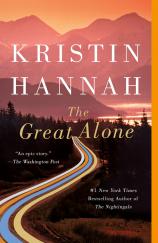Spoiler Alert: Please note that the discussion guide below contain spoilers to the book.
1. “It was otherworldly somehow, magical in its vast expanse. An incomparable landscape.” (31) Alaska is definitely a character in this novel. The author clearly wants you to understand both the grandeur and danger that are present every day in the Last Frontier. How did the landscape create and shape this story? Is this a story that could have taken place anywhere? Or was the solitude of Alaska part of the fabric of the novel?
2. Alaska is called many things. The Last Frontier, The Land of the Midnight Sun, The Great Alone. How do you think these different nicknames describe different parts of the state?
3. What aspects of the Alaska/homesteader lifestyle would you find the most challenging in the wild? How would you handle the isolation, the interdependence among neighbors, the climate? Would you have what it takes to survive?
4. Large Marge tells Cora and Leni that “in Alaska, everyone is either running to something or running away from something.” Do you think this is particularly true to wild places like Alaska? Or has is always been true of the American pioneer? How would you compare and contrast the homesteaders in Alaska to the pioneers in early America, who came west in covered wagons? How are the modern Alaska homesteaders different? How are they the same? What do you think draws people to the wild, unpredictable and remote corners of Alaska?
5. THE GREAT ALONE is set in the turbulent world of America in the 1970s. Why do you think the author chose this time period? How did the world at that time, with the political unrest and kidnappings and plane hijackings, factor into the plot? Why do you believe the back-to-the-earth movement spoke to so many people in the '70s? Why did it speak to Ernt?
6. Do you think the world feels dangerous today? Do you think the unrest and troubles of the '70s are relevant today? Can we learn from them? What does THE GREAT ALONE have to say about the idea of turning one’s back on civilization and the problems of society?
7. If you experienced the '70s, what was it like to read about those years? Did it match up with your memories of it, or color the story for you? Did the popular culture references remind you of your own life? And if you didn’t experience the '70s, what did you learn about the era from the novel?
8. Ernt was a prisoner of war for several years. We know now about PTSD and the ways in which Ernt would have been suffering and the ways in which he could now be helped, but that help didn’t exist in the seventies. Additionally, the Vietnam vets were often treated badly by people upon their return. How do you think Ernt’s war experiences changed him? Do you believe, as Cora tells Leni, that he was “changed” when he came home? Did the war and PTSD “make” Ernt violent, or do you believe he was violent before?
9. Cora is a complicated character. When Leni is reminiscing about her mother and their days in the commune, she notes that “her mother changed her personality just enough to fit in.” What do you think this passage tells us about Cora? Why do you think she stayed with Ernt all those years? Was it love? Fear? In general, why do you think women stay with abusive men?
10. One of the issues highlighted in the novel is the lack of legal support for women in the '70s. Large Marge often makes the point that the law can’t help women like Cora, and Leni, even as young as she is, intuits that only Cora can save herself. Do you think that was true then? Is it true today? Does the law do enough to help battered women?
11. Leni is shaped by the complexity of her parents’ toxic relationship. How does she explain her life before she sees the truth of the violence? As is often the case in abusive families, Leni --- the child --- takes on the role of caretaker. How did it mold Leni’s character, this need to keep the ugly truth of her family, secret?
12. Would you say that Leni is a survivor? Is Cora?
13. “Your mother was a kite string. Without her strong, steady hold on you, you might just float away, be lost somewhere among the clouds.” (126) If you have faced the loss of a loved one, did you find this quote to have special resonance for you? What did the author get right about this sentiment? How else would you describe a mother’s influence? In many ways, THE GREAT ALONE is a mother-daughter love story, but one with a broken spine. How did Cora let Leni down in life, how did she save her? Do you think Cora was a good mother?
14. Leni and Matthew experience first friendship and first love. There is an obvious Romeo-and-Juliet aspect to their love story. How did you feel about their relationship as it was growing? Did you root for them? Or did you feel that Leni was taking a terrible risk that was going to have dark consequences.
15. “This is dangerous, she thought again, but she couldn’t make herself care. All she could think about now was Matthew, and how it had felt when he kissed her, and how much she wanted to kiss him again.” (241) Do you recall your own days of young love and that rush of feeling? Do you think the experience is universal?
16. How did the building of Ernt’s wall affect you as a reader? As he was building it, what did you think was going to happen? Did you think someone was going to kill Ernt? Who did you think the killer would be? Who did you want it to be?
17. Did you see Cora’s explosive act of protection coming? What did it feel like to read that scene? As a parent, do you think you’d be capable of the same act, or write such a confessional letter?
18. Did you hold Leni responsible in your mind for any of Matthew’s misfortune? Why or why not? How does Leni show her devotion in the end? Did you anticipate the kind of future that is set in motion for them at the close of the book?
19. At the end of the story, Leni ends up back in Alaska. Do you think there’s an ultimate place where people belong? How would you know if you got there?









